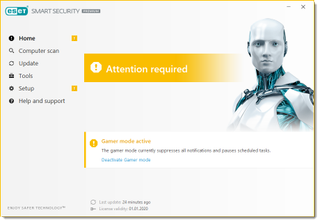
In its short lifetime, video gaming has gone from being a niche hobby to becoming an entertainment juggernaut. However, gaming’s widespread acceptance and ubiquity has, like many other aspects of our digital world, attracted some of the seedier elements – including ones that see gamers as juicy targets... and not just in-game! We no longer live in a world where gamers can afford to tune out and feel safe in an online environment, where the worst that might happen is some idle abuse directed their way.
It turns out that all of that time, effort, heartache, cash, tears and gift cards invested into levelling up, building an epic game library and accumulating the rarest, most-valuable skins and gear is worth a lot of money – and that attracts criminals. Digital thieves are becoming increasingly adept at taking gaming assets, and even accounts, from users and selling them on, as there’s a huge demand for high-level characters and accounts; some on legit markets, some on the dark web.
Unfortunately, there’s often little recourse for victims. Many people reading this will have experienced some variant of the “what counts for support” issue that permeates game networks and publishers. Attempting to resolve, through official channels, a case of digital theft can be a frustrating and lengthy process.
So, if you want to protect your high-level MMO character, your Steam or Epic library, and that super-rare skin (the one that you can’t admit the value of to anyone who’s real-life respect you want to maintain), here are five key things you can do to protect yourself from the cyberattacks that target gamers:
1. Never reuse passwords
It doesn’t matter if you’ve been super careful about never entrusting your impossible-to-guess, multi-character password (that took you weeks to learn) to anyone else on the planet – today, even the largest and most trusted institutions can get hacked. In 2019, it seems like there’s a news story detailing the discovery that someone in a large organisation (or one of their third-party contractors) didn't read the fine print, and stored all customer passwords in an insecure format, and was only discovered when hundreds of millions of credentials started to circulate online. You can probably find one of your most-secure passwords at haveibeenpwned.com – the site has already tracked almost 8 billion known account breaches. So, the critical lesson is that you need to use different passwords everywhere. Ideally, you should employ a dedicated password manager –many of today’s best security suites have one built in.
2. Set up two-factor authentication
The days of two-factor authentication (aka 2FA) being a huge pain in the backside are long over. Nowadays, confirmation texts and emails arrive instantly and authenticator apps are even faster and simpler to use. Make sure you use them, not just on your gaming-service accounts, but also the email address that these accounts are linked to. The bad guys know where all of the weakest links in the chain lie, and not having a properly secured email account is one of the weakest. Don’t get caught out.
3. Don’t share real-world info
Hardened gamers might be well-versed in guarding against online stranger danger, but you shouldn’t let your guard down. The threat is no longer the online equivalent of a “friend who wants to show you their real-life puppies”. If someone can see your gear in a game, you can bet they can tease out enough information to compromise your account and take it away from you. It’s not hard to get a name, age and location from an online mate. With this, they can easily find things like your (former) school, social media profile, job application profile, email, address, pets names and mother’s maiden name. The real world might have some mature, automated, identity-theft protections and guarantees (against losing money) ready to kick in to prevent pilfering, but the cops and card companies don’t monitor (or generally care about) your valuable gaming assets.
4. Be wary of game-related emails – they’re frequently tools of phishing attacks
It’s now so easy for criminals to send bulk emails that, even if they look obvious and anti-spam filters catch 99% of them, it only takes a few to get through to make the practice lucrative. So, if you see an email with a link that asks you to log in to check something in your account, beware! Check that the link is legit (avoid clicking it, and instead go to the service’s official website manually) because a crook could be trying to lure you into giving up your username and password.

5. Get a reliable PC security suite
There are still many PC gamers who think using security software causes performance issues which can impact upon games, and as such, they have no anti-malware protection installed at all. That’s no longer true, as a well-designed security suite doesn’t degrade gaming performance. Moreover, in today’s hyper-connected world, not having a dedicated security app is a recipe for getting hacked, and if that happens, your PC absolutely will have its performance impacted by the malware that could have been stopped by having even basic protection.
If performance is important to you, the digital security specialists at ESET have designed a security suite that’s specially-tailored to the needs of PC gamers. It’s light on resource use, so it won’t slow things down, and its automatic Gamer mode that means it won’t interrupt your gaming session by performing scans or updates in the heat of the battle. Moreover, ESET has almost no false positives, so your favourite indie games and third-party mods and tools won’t get inadvertently quarantined or disabled.
You don’t have to wait to get this protection either: you can trial ESET’s award-winning security suites for free right now.
ESET Smart Security Premium offers the ultimate protection against software threats like malware and ransomware, while also guarding your online transactions and banking. It also monitors your smartphone and smart home devices while simultaneously managing your passwords and securing private folders, and works across Windows, Mac, Linux and Android devices. Click here for a free 30-day trial.
If you just need Mac security, ESET Cyber Security Pro is the best choice, offering protection against malware and hackers and also offers parental controls to keep kids safe online. Click here for a free 30-day trial.
By remembering these key techniques and installing a well designed, low-impact security suite, you can effectively keep yourself out of the cybercriminals’ virtual crosshairs – and get back to the things that matter, like lining up the perfect shot in-game.
In 2019, “playing safe” means protecting what really matters to you – so spend some time securing your digital gaming assets and then let ESET do the rest.
Comic deals, prizes and latest news
Sign up to get the best content of the week, and great gaming deals, as picked by the editors.
